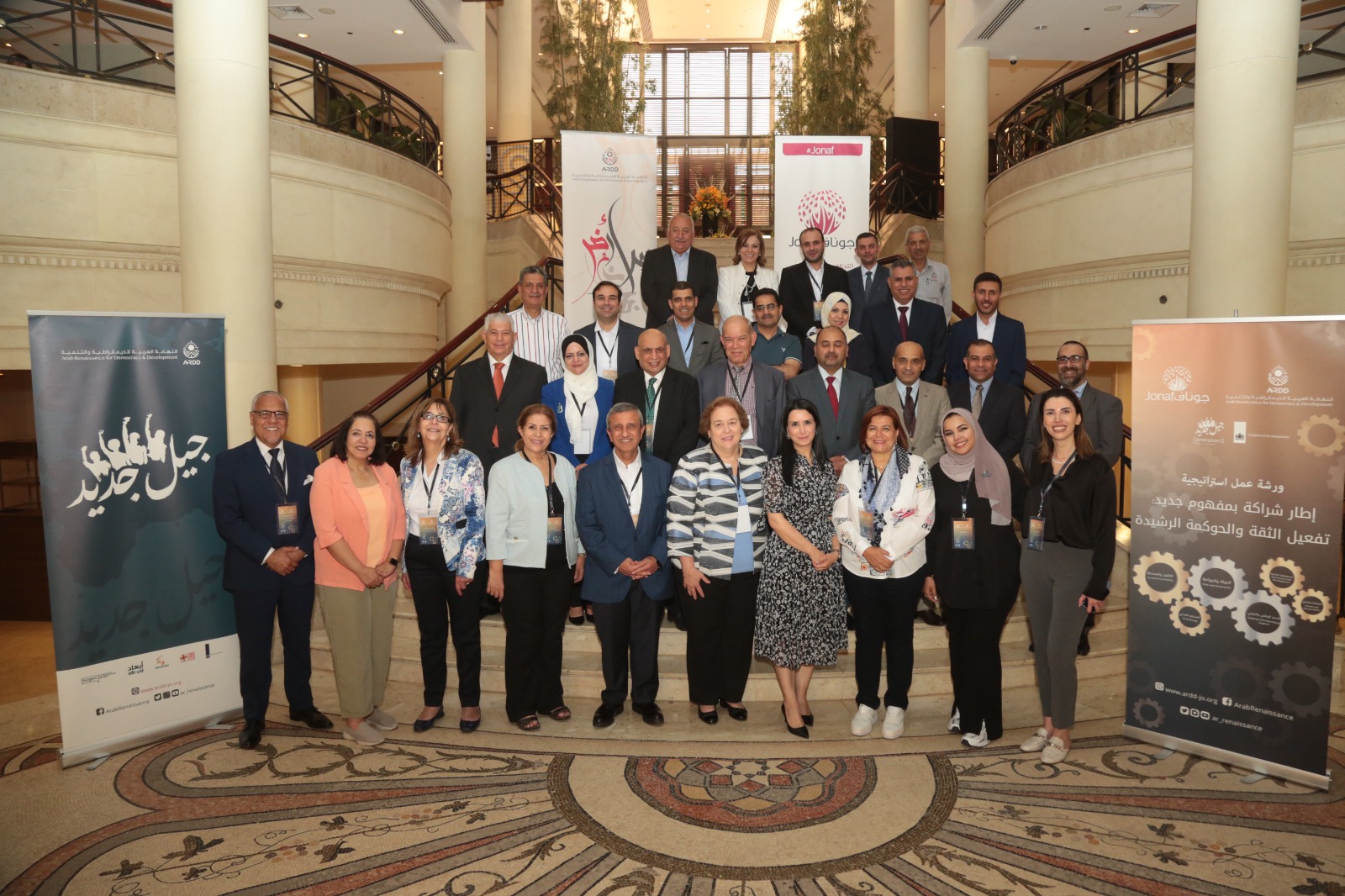“The current reality of civil society and government cooperation is no longer effective, so will the state’s vessel be of any use, if not everyone is on its deck?”
With these words, JONAF Steering Committee member and Senior Consultant at Durrat Al Manal Dr. Sawsan Al Majali launched the strategic workshop organized by the Arab Renaissance for Democracy and Development (ARDD) and the Jordanian National NGOs Forum (JONAF), “A New Partnership Paradigm: Renewed Trust and Functional Good Governance”.
The workshop is part of the New Generation project that ARDD is implementing to enhance youth participation in political and public life.
Al Majali stressed the need to create a charter of understanding between civil society and various parties and to strengthen partnerships. She said that it is crucial to put the interest of the country above everything else and that all parties must be satisfied and reach a consensus.
Over the course of two days, June 16 and 17, 2023, participants from government agencies, civil society organizations, and associations, jurists, and media professionals focused on assessing the situation of civil society; they presented a new view of it, identified the challenges that hinder its work and what might mitigate these challenges.
ARDD Executive Director Samar Muhareb said the civil society plays multiple and varied roles, helping to face crises and supporting reform agendas, adding that historically, no renaissance occurred without civil society pushing for it to happen, and that the government must accept that it exists and strives to cover various need of individuals.
Muhareb reviewed the challenges facing civil society organizations, represented by issues within the society itself, and said that despite the existence of several institutions, the actors in this context are few.
“Then there is a gap between civil society and authorities, there is a multiplicity of government legislation and policies, the challenge posed by the relationship of these institutions with the funding agencies and the funding priorities, and the media relationship with civil society,” Muhareb added.
Participants in the first session stressed the need to make known the reasons for the existence of civil society in its various forms, and its basic role, and to work to strengthen the society’s conviction that it is important to have partnerships between official authorities and civil society, while also striving to build the competencies of civil society workers and of authorities, and to have a continuous dialogue between them.
Participants also stressed the importance of raising the younger generation in a manner that shows them the importance of volunteering and participating in public life, developing their skills and boosting their capabilities, and encouraging the private sector to support civil society to create a local funding environment, while raising the media awareness of the importance of civil society.
The participants agreed that the principles of good governance is only achieved by setting standards that organize public work, as well as by forming an administratively and financially independent body to coordinate with the various parties, with the aim of improving the work environment and the mechanisms of coordination, supervision and follow up, as well as unifying the legal references that organize the work of civil society, and establishing a government database for all classifications of civil institutions.
The participants called for a comprehensive review of the laws and regulations pertaining to the work of associations with a view to making their work easier, for example by granting customs and tax exemptions, classifying associations according to their work, performance, obligations, goals, and activities, and institutionalizing communication between organizations and official bodies.
As for supporting specialized alliances that supervise coordination and the exchange of information among all parties, the participants in the second session reached the conclusion that such alliances are based on coordination between civil society and official bodies, and that the members of these alliances need to be provided with training and access to donors. They also stressed the need to strengthen the localization of humanitarian work, and to recognize these alliances as coordinating bodies that facilitate work between institutions and official bodies.
Participants expressed the need for specific, clear, and applicable recommendations of a procedural nature, for identifying the bodies responsible for the implementation of these recommendations, for developing and sending them to working groups for study and evaluation, for providing a database to unify efforts, and for creating a council based on a partnership between public sector and civil society.
Participants also said that it is important to work on many fronts: amend the law on associations, work with global civil society groups and create synergies within the national civil society itself; hold talks and discussions in this regard and presenting the outcome of the workshop to the Senate.
According to the participants, the government exists to enhance the political and public participation of the youth, but while acknowledging the lack of trust between them and the various parties.
The participants also called for reviewing and re-studying the funding mechanisms at the Ministry of Planning and International Cooperation and passing the foreign funding file to the Ministry of Foreign Affairs and Expatriates, which is the case in several countries.
To conclude, the participants acknowledged that there are various challenges, but there are also great efforts by the government, civil society, and governmental representatives to reach common points of view and address the challenges and to move forward with public work and that the goal is to unify the legal and institutional reference by establishing a specialized governmental body that deals with all civil society affairs. They also stressed the need to continue searching for a new basis for the relationship among all stakeholders, governed by trust and good governance.


